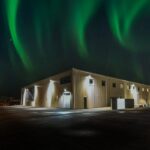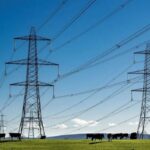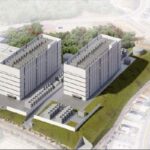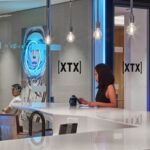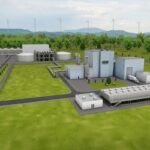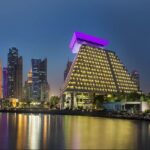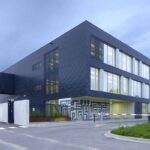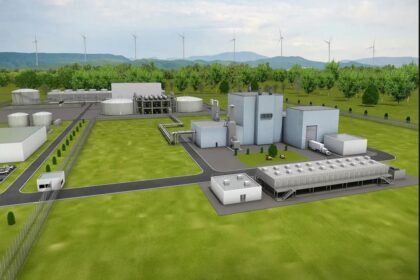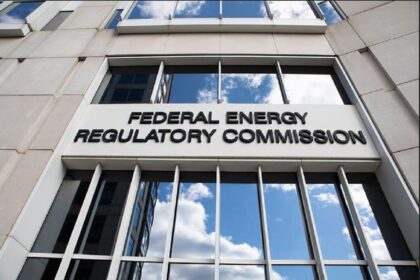In a significant move that merges the potential of advanced nuclear technology with cutting-edge AI infrastructure, LS Electric and Korea Hydro and Nuclear Power Corporation (KHNP) have entered into a Memorandum of Understanding (MoU) to explore the development of AI data centers powered by small modular reactor (SMR) technology. This partnership marks a pivotal step towards creating sustainable and reliable energy solutions for the rapidly expanding data center sector.
What is the Role of Small Modular Reactors (SMRs) in AI Data Centers?
Small Modular Reactors (SMRs) have gained increasing attention as a potential solution to the energy needs of modern data centers, particularly in light of their growing energy demands. The i-SMR developed by KHNP, with a projected capacity of 170MW, is central to this collaboration. These compact nuclear reactors are seen as a sustainable, low-carbon power source that could reliably supply AI data centers with the substantial amounts of energy required for operations.
SMRs are designed to provide stable and scalable power, making them an ideal match for AI-driven data centers, which demand high computational capabilities and, consequently, substantial electricity. The integration of SMR technology with data centers aims to address the industry’s energy consumption concerns while promoting green, efficient power solutions.
The Strategic Partnership: LS Electric and KHNP’s Role
Under the terms of their agreement, LS Electric and KHNP will combine their expertise to explore AI data center development and innovative grid solutions powered by SMRs. LS Electric, renowned for its leadership in South Korea’s commercial data center power infrastructure, will bring its advanced power systems and distributed energy technologies to the table. KHNP, with its experience in nuclear energy, will contribute its cutting-edge i-SMR technology.
This collaboration also aims to support research and development for a smart net-zero city in South Korea. The project will explore how SMR technology can be integrated into urban infrastructure to create a sustainable, energy-efficient environment.
The Market Opportunity: Growing Demand for AI Data Centers in South Korea
South Korea is experiencing rapid growth in the data center sector. The country’s total data center capacity is forecast to increase by 2.4 times by 2027, reaching a capacity of 3.2 GW. South Korea has become a hub for data center development, attracting major players such as Amazon Web Services (AWS), Microsoft, Kakao, and Naver.
However, the country’s grid infrastructure has struggled to keep pace with the demand for energy from these data centers. This is particularly evident in Seoul, where limited transmission capacity and strict regulations have made it increasingly difficult for companies to acquire grid connections. As a result, many data center operators are turning to behind-the-meter energy solutions, like the one proposed by LS Electric and KHNP.
Why SMRs Are Gaining Traction for Data Centers
The SMR market is quickly becoming a focal point in the global effort to provide sustainable, reliable energy for data centers. SMRs offer the promise of delivering cleaner energy compared to traditional fossil fuels, which are the primary power source for most data centers today.
A growing number of major data center operators are entering into supply agreements with SMR developers. In 2024 alone, leading companies like Amazon, Equinix, and Google have signed contracts with SMR firms, signaling the increasing relevance of SMR technology in powering next-generation data centers.
LS Electric’s Leadership in the Data Center Market
LS Electric holds a dominant position in South Korea’s data center power infrastructure, with a 60% market share. The company has demonstrated its capability by collaborating with Vertiv Korea to develop integrated power solutions for the country’s data center market. This new partnership with KHNP further solidifies LS Electric’s leadership in the industry, positioning it as a key player in the evolution of energy solutions for the data center sector.
As data center operations grow more complex, the demand for power infrastructure that can support high-performance computing while ensuring sustainability is increasing. LS Electric’s expertise in power systems and KHNP’s innovative nuclear solutions are expected to meet these needs effectively.
KHNP’s Progress on the i-SMR Technology
KHNP’s i-SMR is designed to be an integrated pressurized water reactor with an electrical output of 170MW. The company is working toward completing the standard design of the i-SMR by the end of 2025, with plans to gain regulatory approval by 2028. This ambitious timeline demonstrates the company’s commitment to advancing nuclear energy solutions that can be seamlessly integrated into modern data centers.
The i-SMR’s ability to produce a steady supply of clean energy is particularly important as data centers increasingly move toward artificial intelligence (AI) and machine learning workloads, which require both reliable and scalable power sources.
A New Era of Smart Net-Zero Cities Powered by SMRs
Beyond the development of AI data centers, the partnership between LS Electric and KHNP also envisions the potential for creating smart, net-zero cities. These cities would integrate advanced SMR technology with innovative power systems to reduce carbon footprints while ensuring energy efficiency across urban environments.
By combining the capabilities of LS Electric and KHNP, the companies aim to create a platform that can be exported globally, paving the way for new industries in sectors such as batteries, electric vehicles, and semiconductors. The collaboration could lead to transformative changes in how cities are powered and how data centers operate, setting a new standard for sustainability in urban development.
The Future of Data Center Energy Solutions: Behind-the-Meter Agreements
The MoU between LS Electric and KHNP is just one example of how data center operators are seeking behind-the-meter energy solutions. In November 2024, another partnership between Korea Southeast Power and Samsung C&T with the Chungnam regional government was announced to develop a hydrogen fuel cell power plant linked to a data center.
This “Dangjin Green Energy Hub” will be South Korea’s first fuel cell hydrogen power plant and will utilize a 900MW hydrogen plant along with 300MW of battery storage to support data center operations. These agreements reflect the growing need for alternative, sustainable energy sources in the face of rising data demands.
Global Implications and Market Trends
The global demand for data centers, especially those focused on AI and machine learning, is expected to drive further adoption of clean and sustainable power sources like SMRs. As regions around the world seek to meet the increasing energy demands of next-generation data centers, partnerships like the one between LS Electric and KHNP will likely become more common.
In the US, companies such as Amazon, Equinix, and Google have already signed agreements with SMR developers. The success of these partnerships could pave the way for similar collaborations in other regions, further promoting the role of SMRs in the data center sector.
FAQ: Common Questions About SMR-Powered AI Data Centers
What is an SMR?
A Small Modular Reactor (SMR) is a compact nuclear reactor designed to produce clean, reliable energy. It is smaller and more scalable than traditional nuclear reactors, making it ideal for powering industries such as data centers.
How will SMRs benefit AI data centers?
SMRs can provide a reliable, sustainable power source for AI data centers, which require large amounts of electricity. They offer a low-carbon alternative to traditional power sources, helping data centers meet their energy needs while reducing their environmental impact.
Why are behind-the-meter agreements important for data centers?
Behind-the-meter agreements allow data centers to secure a direct power supply, bypassing grid limitations and ensuring a stable energy source. This is increasingly important in areas with grid capacity constraints.
How will the partnership between LS Electric and KHNP affect the data center industry?
This partnership aims to develop sustainable and efficient power solutions for AI data centers, potentially transforming the energy infrastructure supporting data center operations both in South Korea and globally.
When will the KHNP i-SMR receive approval?
KHNP expects to complete the standard design of the i-SMR by 2025 and aims to gain regulatory approval by 2028.




